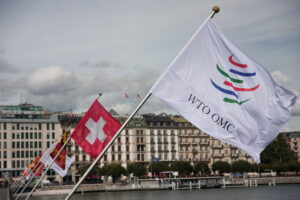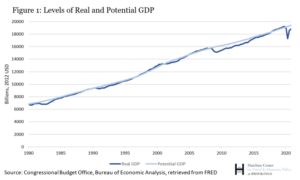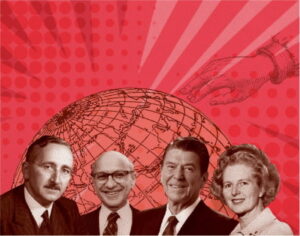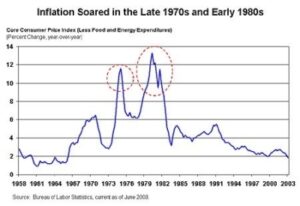Table of Contents
What is the World Trade Organization?
I often find useful definitions on the website Investopedia.
Created in 1995, the World Trade Organization (WTO) is an international institution that oversees the global trade rules among nations. It superseded the 1947 General Agreement on Tariffs and Trade (GATT) created in the wake of World War II.
What does the World Trade Organization do?
They oversee global trade between nations, and there are currently 164 member countries.
Is the World Trade Organization a government?
No. The rules of trade are determined by international treaties.
The WTO helps government negotiate these treaties, and once the rules are established, the WTO helps governments resolve trade disputes.
They seem to be more of an international mediation service than a government.
The WTO however, is a driving force behind globalism
Which has been both good and bad.
Developing economics have benefited by setting up factories while simultaneously manufacturing areas of developed nations have suffered for precisely the same reason.
Stuff is made in cheaper parts of the world resulting in stuff being cheaper, but due to the job losses in developed countries due to having moved factories around the world, people in the developed countries have less money with which to buy that cheaper stuff.
Where is their HQ? What is their structure?
The WTO is headquartered in Geneva Switzerland.
The WTO has about 600 staff members working in about 80 countries.
While the WTO is not a legislative body, it has an org chart that looks like one.
There are multiple committees that report up to various councils, that have different areas of responsibility.
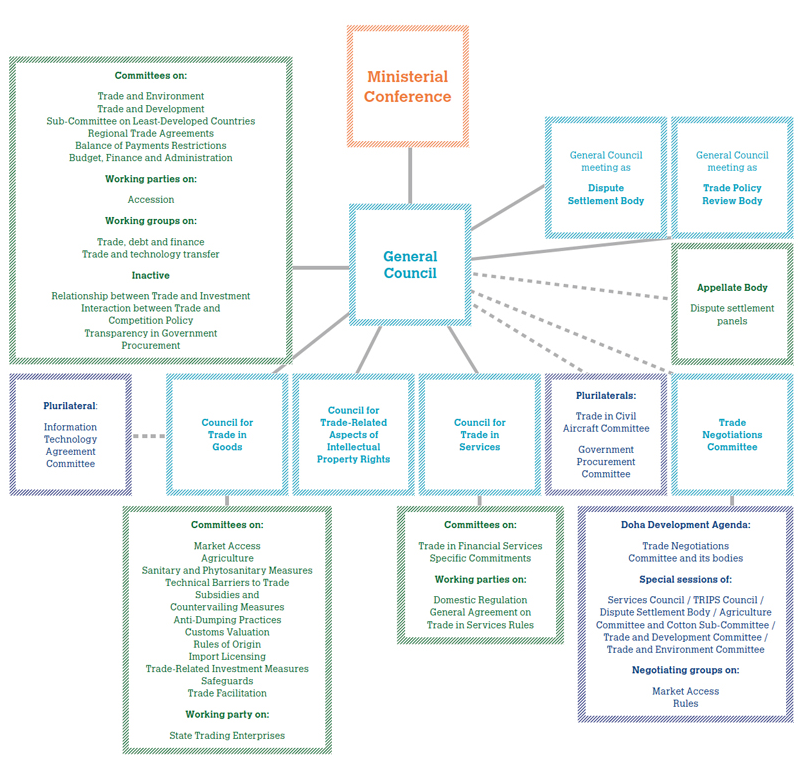
Who benefits the most?
Per Dr. Chrisitain Bluth, of BertelsmannStiftung GED, the biggest winners have been Germany, China, and the USA, when measured as increases to GDP.
Income gains have been $87B to US companies, $86B to Chinese companies, and $66B to German companies.
Bear in mind these are income gains to companies based in those nations, not necessarily people working at those companies.
This does not in any way refute the reality that US rust belt manufacturing, and the communities which derived income and wealth from that manufacturing, have experienced a significant decline in prosperity over the past few decades.
What are WTO criticisms?
There are several, and they come from various perspectives.
Some industries within some countries want greater trade protection
Sometimes, it’s not about money. Sometimes it’s about self-sufficiency.
Sometimes it’s about ensuring that supply chain shocks that might decrease critical imports don’t cause problems if and when they occur.
This is especially true of developing nations and their agricultural sectors.
For this reason, to encourage and allow for domestic food production, nations impose tariffs on imported wheat (for example) when, for various reasons, imported wheat is always cheaper than domestically grown wheat.
Being dependent on foreign grown food becomes a problem when the flow of imported foodstuffs is disrupted, for any reason.
Some people within some countries want greater resource protection
Free trade often ignores environmental concerns.
Even within the United States, private companies are claiming and being granted, ownership of what were previously considered to be public resources.
Nestles is taking massive amounts of water from California’s Strawberry Creek, paying practically nothing for it, selling it as bottled water, and causing downstream creeks to run dry.
There are people working to stop the spread of fracking in South America because fracking operations are contaminating nearby water supplies, which local populations use for everyday uses, such as drinking, bathing, etc.
Some companies in some industries want greater access to natural resources
WTO rules purport to strike a good balance between protection of natural resources within the borders of a nation-state and providing access to those resources to corporations based in other WTO member nations who want to profit from them.
There are examples of the WTO seeming to side with corporations over individuals and local populations.
Some nations complain that other nations skirt the rules and get away with it
I personally find these complaints especially interesting as while the above criticisms can be framed as David vs Goliath situations, this is Goliaths vs other Goliaths.
Take for example the recent trade war between the USA and China.
Two of the largest economies in the world and two of the largest beneficiaries of WTO membership.
The Cato Institute claims China is cheating, which I’ve heard elsewhere as well.
Interestingly, their suggested remedy is to use the WTO complaint process, because they claim that while China does have a record of cheating, they also have a record of complying with WTO decisions.
How are WTO complaints handled?
If the parties to the dispute are unable to work out their differences, the WTO has a fairly lengthy and somewhat complex process of mediation.
Below is the flowchart of their dispute settlements process from their website.
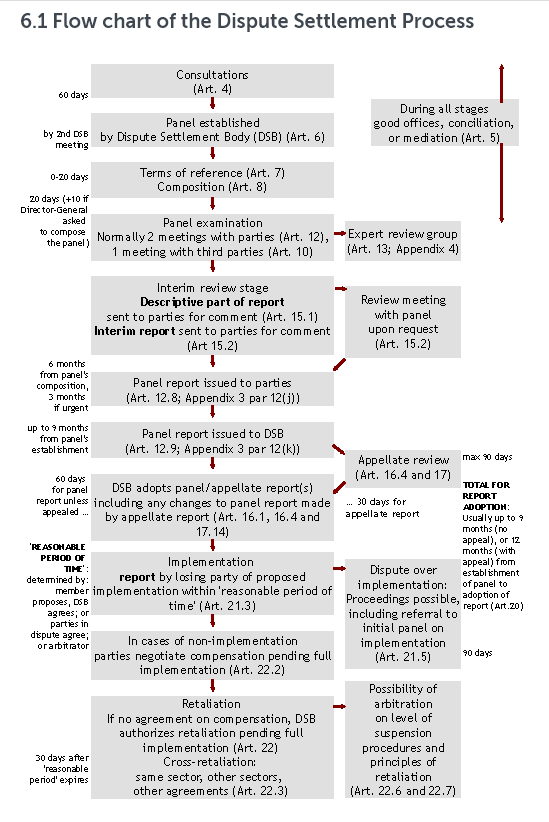
Notice the step: Panel established, the second step from the top.
This is what happens if the parties involved are unable to resolve the complaint themselves.
What are panels?
From the WTO Dispute Settlement System Training Module, Chapter 3.
Panels are the quasi-judicial bodies, in a way tribunals, in charge of adjudicating disputes between Members in the first instance.
Who sits on these panels?
There are no permanent panels.
Panels are created on an as-needed basis, one complaint at a time.
Each panel consists of three or five people who are experts in the topic under dispute.
From the WTO Dispute Settlement Understanding, Article 8, Composition of Panels:
From paragraph 1:
Panels shall be composed of well-qualified governmental and/or non-governmental individuals, including persons who have served on or presented a case to a panel, served as a representative of a Member or of a contracting party to GATT 1947 or as a representative to the Council or Committee of any covered agreement or its predecessor agreement, or in the Secretariat, taught or published on international trade law or policy, or served as a senior trade policy official of a Member.
From paragraph 4:
To assist in the selection of panelists, the Secretariat shall maintain an indicative list of governmental and non-governmental individuals possessing the qualifications outlined in paragraph 1, from which panelists may be drawn as appropriate.
From paragraph 6:
The Secretariat shall propose nominations for the panel to the parties to the dispute. The parties to the dispute shall not oppose nominations except for compelling reasons.
So the people who sit on these dispute panels are topic experts selected by the WTO Secretariat, which it’s important to understand, is not a person, but rather is a team of ten lawyers and four support staff, working out of the WTO offices in Geneva.
The Secretariat is headed by the WTO Director-General.
It would seem the Director-General and these ten lawyers have a fair amount of power.
Could WTO complaint rules ever override national laws?
In theory yes. Whether this ever has or has ever happened, I don’t know.
And while the WTO claims WTO rulings can never undermine national sovereignty, in the event a nation elects a government that signs a treaty giving multinational corporations access to some resource, and a later government, be it 5 years or 20 years later passes a law that somehow protects that some resource in a way that restricts access, passing that national law is not sufficient.
The nation must also revise the original treaty.
Having said that, the WTO website claims this has occurred eight times in the past.
